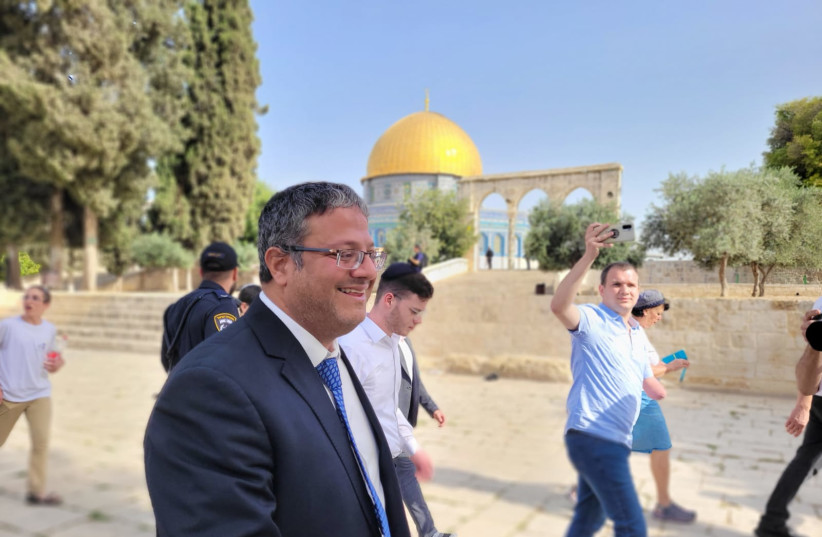Since Benjamin Netanyahu won the elections in November, his government has been described by the international mainstream media as the most right-wing government in the history of Israel. Far-right politician Itamar Ben-Gvir, designated as Israel’s national security minister, was previously convicted of anti-Arab racism. Wielding a gun in confrontations with Palestinians during the Sheikh Jarrah clash, he was described even by Israeli media as extremist.
The world almost held its breath; what happens next with a government that ignites fear and anxiety across the Arab world? When Ben-Gvir stormed the courtyards of Temple Mount during the first week of the new government, the world’s fears were confirmed.
It might be assumed that this fear of Netanyahu’s government across the Arab world is simply a perpetuation of the ongoing Palestinian-Israeli conflict, especially because it’s a right-wing government. However, upon closer inspection, there is evidence of internal Israeli conflict and opposition to Netanyahu’s government, which are fueling these wider concerns and relaying them to the world.
In fact, the biggest storm against Netanyahu’s government mainly originated from Israeli leftists and the opposition, propelling Ben-Gvir’s visit to an international level in the media. Opposition leader Yair Lapid claimed that Ben-Gvir committed a most explosive act there and suggested the move could lead to bloodshed. He also opined that only lawmakers rather than ministers could ascend Temple Mount, saying that otherwise it would be viewed by the whole world as breaking the status quo, even if it’s not.
Some Israeli analysts have taken it to another level, fearing that Ben-Gvir’s actions might lead to a third Palestinian intifada, which in turn would create extremist positions giving Palestinian voices the opportunity for a return to the rhetoric of violence. This would necessarily impede peace-building efforts and ignite tensions in the region.

Diplomatic approaches to Israel's new government
For Netanyahu’s opposition, there is now fertile ground for challenging the government, especially with the presence of the Biden administration, which condemned and strongly rebuked Ben-Gvir’s visit to the Temple Mount in Jerusalem. Even though President Joe Biden looks forward to working with Netanyahu’s government, the White House has previously dodged questions over Netanyahu’s right-wing politics, which are quite different from Biden’s administration Center-Left Democratic Party, criticizing his far-right position at home. Consequently, Netanyahu’s government will be under greater political scrutiny, as well as greater scrutiny in the media.
Such a complex situation has put a spotlight on the importance of diplomacy and here is where the Abraham Accords countries come in. Some condemned the visit while others engaged in diplomatic talks, for example, the United Arab Emirates, which established full diplomatic ties with Israel in 2020, strongly condemned the storming of al-Aqsa Mosque courtyard by an Israeli minister under the protection of Israeli forces.
IT CALLED on Israel to halt serious and provocative violations taking place there. Moreover, Emirati diplomacy went further than mere condemnation, also calling for an emergency session of the Security Council as a representative of the Arab League in the Council. This clearly demonstrates concern about the two-state solution and the UAE’s firm support for the Palestinian cause.
While there was condemnation, there were also diplomatic talks to end the ongoing disputes in the Palestinian territories. Israeli Ambassador to the UAE Amir Hayek had a phone call with UAE Minister of State for International Cooperation Reem Al Hashimy and clarified that Ben-Gvir’s visit to the holy site did not present a change in the status quo and that the incoming government had no intention of enacting any such changes. In fact, the gains made by the Abraham Accords – economic, technical, security and educational – have been so successful that no one wants to lose all these gains because of a lack of diplomacy.
Ben-Gvir’s visit might appear fairly run-of-the-mill to his supporters at first glance but it is the attitude with which he entered the courtyards of the Temple Mount, with the presence of Israeli forces to protect him and without any diplomatic coordination, that was so inflammatory. Along with a left-leaning international media that has created an image of Netanyahu’s government as belligerent, as well as the opposition playing their part, the situation quickly escalated and led to global condemnation.
Overall, Netanyahu’s government, whether it is called the most right-wing or ultranationalist, should be respected because it has been democratically elected. However, it needs to operate more empathetically and utilize the tools of diplomacy, especially because its opposition is just waiting to pounce on any mistake it makes to then propel it onto the international stage.
The role of public diplomacy is significant here, especially when it comes to sensitive matters that might be detrimental to peace treaties. Accordingly, coordinating with diplomatic channels and communicating through impartial media is crucial but to be able to do that, more bipartisan coordination and agreements are needed among the political parties within Israel.
The writer is an adjunct professor at the American University in the Emirates, specializing in political media and communication. Her book Twitter Diplomacy: Media Polarization Before and After the Abraham Accords has been classified as a bestseller in the US. She can be reached at najatalsaied@gmail.com.
